The Bang Bang Club Blu-ray Movie
HomeThe Bang Bang Club Blu-ray Movie 
Entertainment One | 2010 | 97 min | Rated R | Aug 16, 2011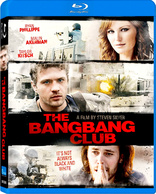
Movie rating
7.2 | / 10 |
Blu-ray rating
| Users | 0.0 | |
| Reviewer | 4.0 | |
| Overall | 4.0 |
Overview
The Bang Bang Club (2010)
A drama based on the true-life experiences of four combat photographers capturing the final days of apartheid in South Africa.
Starring: Ryan Phillippe, Malin Akerman, Taylor Kitsch, Frank Rautenbach, Neels van JaarsveldDirector: Steven Silver
| Biography | Uncertain |
| History | Uncertain |
| Drama | Uncertain |
Specifications
Video
Video codec: MPEG-4 AVC
Video resolution: 1080p
Aspect ratio: 2.35:1
Original aspect ratio: 2.39:1
Audio
English: DTS-HD Master Audio 5.1 (48kHz, 24-bit)
Subtitles
English
Discs
50GB Blu-ray Disc
Single disc (1 BD)
Packaging
Slipcover in original pressing
Playback
Region A, B (C untested)
Review
Rating summary
| Movie | 4.0 | |
| Video | 4.5 | |
| Audio | 4.0 | |
| Extras | 2.5 | |
| Overall | 4.0 |
The Bang Bang Club Blu-ray Movie Review
A picture is worth a thousand bullets.
Reviewed by Jeffrey Kauffman August 19, 2011If you’re old enough to remember the heyday of weekly magazines like Life and Look, you probably remember how visceral some of the photos contained in those pages could be. When Life started publication in the late 1930’s, it was one of the few media where people could actually see what was going on in the world around them. While newspapers had more or less mastered the lo-fi world of the wire photo, Life (and later Look when it came along) offered relatively hi-res photos that seemed to jump off the page and take readers to hotspots around the world, without having to journey to the local theater to catch that week’s newsreel. Somewhere along the way the public became incredibly sanguine about news photos, just accepting them as rote objects, nothing special. Television probably had a lot to do with this, especially once more portable cameras made field reporting more feasible. And of course Life and Look, along with most if not all weekly magazines of their time, faded into the sunset as the 1970’s slogged along. It’s a little strange, then, that a film celebrating the news photographer should come along at this late date, and it’s perhaps even odder that not only is it based on a real life situation, that situation is from so not very long ago—the 1990’s, in fact. As South Africa was teeming with violence after Nelson Mandela’s release, but before the outright abolition of apartheid, the country was rent asunder by warring factions, including the perhaps surprising feud between different black peoples, not all of whom thought of Mandela as the guardian angel of their country. Into that fray came several foreign journalists, who adopted the nickname The Bang Bang Club, obviously referencing the sound of gunfire which punctuated so many South African days and nights in that time. This film takes a semi-documentary look at the four and the turmoil they encountered. It’s a disturbing film, but one which explores some little or at least lesser known nooks and crannies within the wider known story of what was going on in South Africa circa 1990-94.
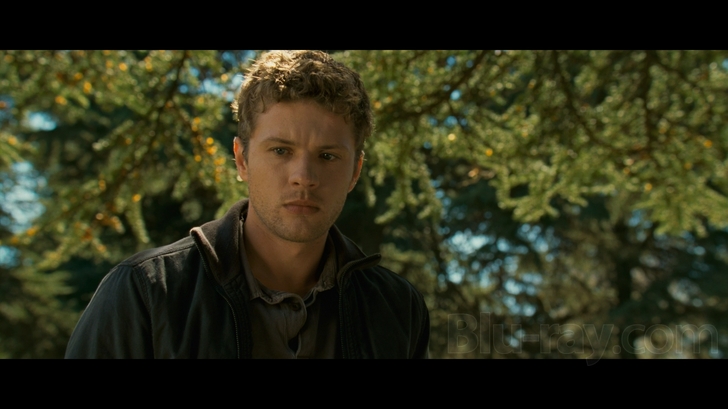
There’s an unstated irony in the art of news photography which The Bang Bang Club explicitly explores. While the news photographs themselves provide a window into the world for an audience, gaining them access to images, stories and ideas which they most likely couldn’t experience firsthand, the photographer actually has to maintain something akin to an objective distance to properly do his (or her) job. It’s as if the camera itself becomes a shield for these photographers, something that puts up an invisible barrier between themselves and the stories they’re photographing. That odd dichotomy becomes even odder when the story is something as roiling and violent as the clashes that broke out as apartheid met its death throes. New to the scene photographer Greg Marinovich (Ryan Phillippe) doesn’t quite have the objectivity that’s required for the job, but he makes up for that with a perhaps foolhardy nature (or incredible naïveté) which lets him go where angels fear to tread—into a Zulu compound where he’s warned by a child he’ll probably be killed. Instead Marinovich walks out with several photographs which as inartful as they may be helps to establish his “street cred” and gets him a sort of day laborer job for South Africa's The Star photographing the unrest which is a daily occurrence in the squalid townships of South Africa.
Greg quickly becomes part of a loose knit group of photographers who call themselves The Bang Bang Club. These photojournalists include Kevin Carter (Taylor Kitsch), from whose point of view much of The Bang Bang Club is actually told; Ken Oosterbroek (Frank Rautenbach), the putative elder statesman of the group; and João Silva, a devil may care type (Silva actually lost part of a leg later in his career while on a job in Afghanistan). This group of guys provides The Bang Bang Club with its supposed focus, but it is also one of the more pat elements of the film (despite being drawn from “real life”), with brash newcomer Greg barging into the unit, proving himself, and then going on to be one of the “leaders,” as it were. Greg’s mini-affair with The Star’s photo editor (Malik Akerman) also seems trite and isn’t developed well enough to provide much meaning or emotional heft to the story.
Where The Bang Bang Club excels is in its depiction of the camaraderie forged under stressful conditions, one which is aptly akin to that forged by actual soldiers experiencing battle. The film is also spectacularly, if unsettlingly, successful in recreating the abject violence which beset the townships in those days. Several brutal murders are reenacted and they provide the film with a jolt of electricity that is hard to forget. In fact, The Bang Bang Club may surprise a lot of viewers as it shows the outright hatred several competing black elements had for each other (notably the Zulus against the African National Congress), something most Westerners will probably find odd, thinking that all blacks must have been a homogenous unit fighting their white overlords, something which was manifestly not the case.
There are a couple of stumbles along the way, however. The film never really adequately explains the hatred between the Zulu and the African National Congress, choosing instead to set up the conflict with a brief textual prelude and then letting the viewer witness one shocking act of violence after another. The film could have used a little more context to have deepened its emotional impact, though that said, there’s no denying the visceral horror that several on screen murders evoke. Perhaps more troubling, but in a more subtle way, is the film’s point of view, which is really tilted more toward Kevin than Greg. In fact it’s Kevin’s crisis of conscience over a picture which wins him the Pulitzer Prize which gives the film its philosophical edge and its most relevant moral point. When a tragic denouement occurs in the film’s final moments, it makes this point of view all the stranger, leaving the film’s coda hanging out there like some weird sort of afterthought.
All in all, though, The Bang Bang Club is an extremely impressive feature film debut for Silver, who manages large scale epic scenes with ease and also hones in on some fine character work from a well chosen cast. If the film ultimately doesn't really help us to understand more about apartheid, that’s really not its mission. The film is instead a meditation on friendship and camaraderie, as well as an inquiry into exactly where a photograph ends and personal responsibility begins.
The Bang Bang Club Blu-ray Movie, Video Quality 
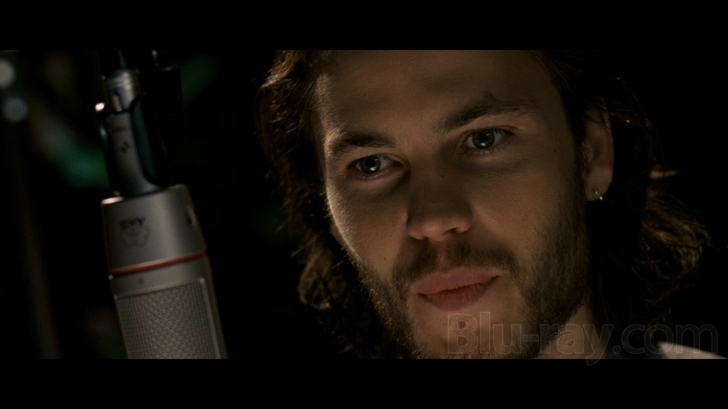
The Bang Bang Club arrives on Blu-ray with an AVC encoded 1080p transfer in 2.35:1. Silver has shot this film in a quasi-documentary style that features a lot of jiggling handheld camerawork and some fairly low lit interior scenes. That said, this is a really sharp and excellent looking high definition presentation, with abundant fine detail, excellent contrast and color (occasionally skewed toward the yellow side of things), and above average black levels and shadow detail (though there is some minor crush in some dark interior sequences). The dusty, squalid environs of Soweto and the townships comes vividly alive in this presentation and some of the shocking acts of brutal violence are caught in crystal clarity, upping the discomfort level immensely. Some of the more kind of strangely sylvan interludes also look fantastic, with excellent depth of field.
The Bang Bang Club Blu-ray Movie, Audio Quality 
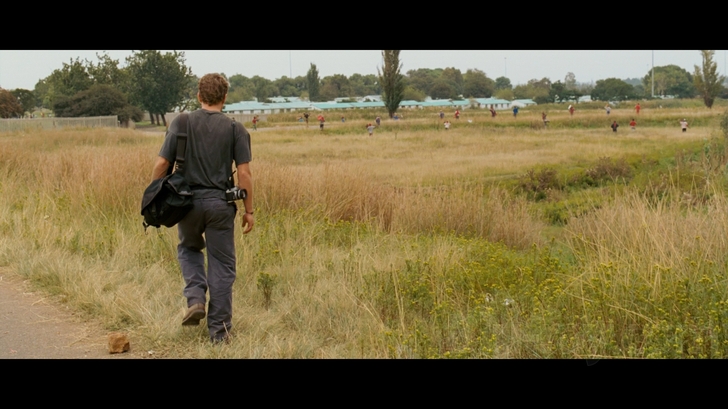
The Bang Bang Club features a lossless DTS-HD Master Audio 5.1 mix which is long on fidelity and boisterous low end, but which is surprisingly front channel-centric. While there are certainly effects and ambient environmental noises filling the surrounds, I expected a much more immersive experience than what is here, especially in several of the violent crowd scenes. If you don't mind having most of the soundfield in front of you, though, this is a well realized and very artfully mixed track that combines dialogue, effects and some effective source cues very well to create a suffocating feeling of dashed dreams and simmering violence.
The Bang Bang Club Blu-ray Movie, Special Features and Extras 
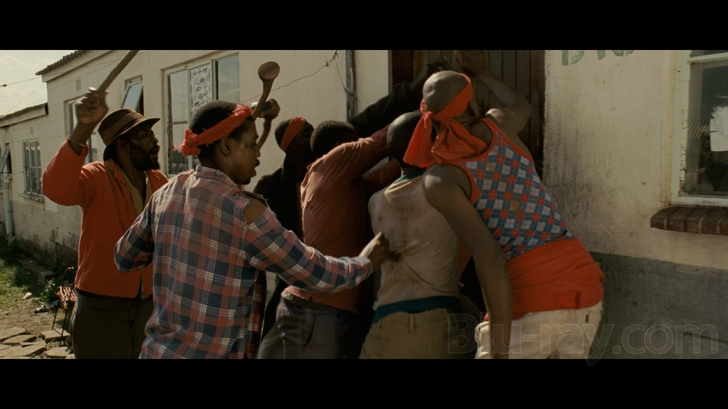
- Feature Commentary with Writer/Director Steven Silver. This is a low key but illuminating and very interesting commentary, as Silver recounts how he restaged all of these real life events, often exactly where they actually happened. While there's a fair amount of pure description here of what we're seeing on screen, Silver marries it to the real life events really well, helping to bring some added insight.
- The Making of The Bang Bang Club (1080i; 45:01) is a surprisingly good in-depth piece that provides a lot of behind the scenes footage and interviews, but which is elevated by its connection to real life events.
- The Bang Bang Club Behind the Scenes Slideshow (HD; 4:05) plays to some ethnic music.
- Deleted Scenes (1080i; 5:29) has a handful of short scenes, including an alternate opening (with a bit more information on the war between the Zulu and the ANC), as well as some extra bits involving Greg and his editor girlfriend.
- Kgose Mongake Interviews Cast and Crew (1080i; 17:20). Kgose is a charming South African kid who plays a bit role in the film, who here does a great job getting information from the cast and crew.
The Bang Bang Club Blu-ray Movie, Overall Score and Recommendation 
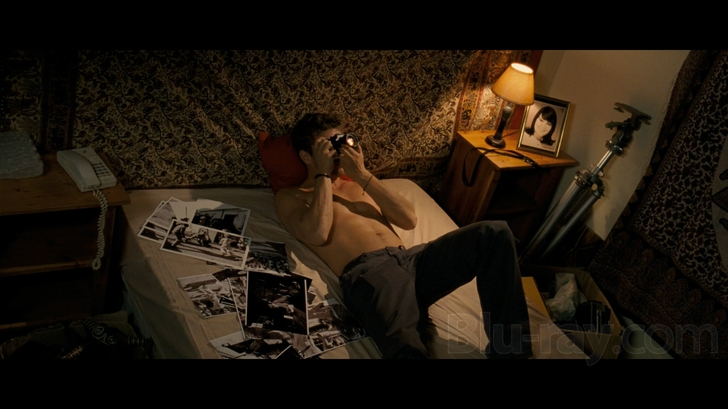
The Bang Bang Club is an often completely unsettling experience (word to the wise: there are at least two extremely vicious murders depicted with unflinching honesty in this film). While it doesn't really delve deeply enough into the root causes of the evidently long simmering hatred between the Zulu and the ANC, perhaps it doesn't need to. The conflict, as horrifying as it is, is really just a motivating factor to get us into the lives of these photographers, and what covering hideous violence like this can do to them. On that score, The Bang Bang Club is astonishingly effective. Highly recommended.
Similar titles
Similar titles you might also like

The Last King of Scotland
2006

Mandela: Long Walk to Freedom
2013

The Post
2017

Cesar Chavez
2014

Frost/Nixon
2008

The Zookeeper's Wife
2017

Mark Felt: The Man Who Brought Down the White House
2017

Jimmy's Hall
2014

The People vs. Larry Flynt
1996

Charlie Wilson's War
2007

Spotlight 4K
10th Anniversary Edition
2015

Richard Jewell
2019

A Mighty Heart
2007

Restoration
1995

Winnie Mandela
2011

Napoleon 4K
2023

House of Gucci 4K
2021

The Current War
Director's Cut
2017

Victoria & Abdul
2017

Masters of Sex: The Complete Series
2013-2016